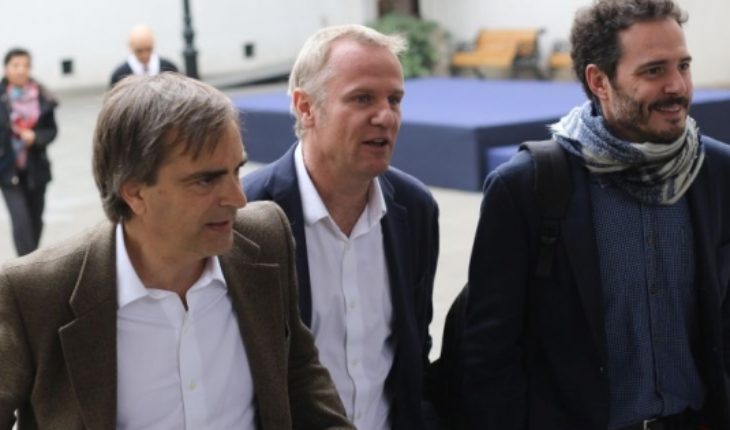From the UDI they assured that this was the moment That La Moneda had to try to encompass all that could, taking advantage of the discredit of the opposition, and without Michelle Bachelet on the way. The reading that was made was that with Beatriz Sánchez at the helm, the entry – by way of pact – of the republican movement of José Antonio Kast to Chile Vamos, would not be a factor of such wide relevance to the center world. With this move what I would seek is greater stability, but the Government’s determination to apply the “bear hug” made flesh the saying that says “that the much encompasses, little squeezes”, since, in the liberal world of officialism, typecast mainly in Evópoli, resented the manoeuvre and did not fall well at all. She was labeled an intrusion, and wet like a bucket of cold water.
Sobida is the tension that the Government has been born since the beginning of the presence of the former UDI, José Antonio Kast on the political map of the Chilean right, first calling on pinechetism to leave the silence, defending those convicted of crimes against humanity held in Punta Peuco, but also with an aggressive speech that has no contemplations either with the Government – which it accuses of lack of convictions – nor with the members of Chile Vamos, who he points to as representatives of the “right light”. For all that, the liberal sector of the ruling conglomerate – represented mainly by Evópoli, but with several figures within the National Renewal, and less, but representatives, after all, also within the UDI – from the beginning has made it the cross to the man who won 8% of the vote in the last presidential election. They all recalled the words of Cecilia Morel in December 2018 when she noted that “J.A Kast is representing a sensibility that I would not want to continue to enlarge”, words endorsed by the Representative himself, who five days later added: “Once again I agree with my wife.”
But if there is a definition for political record that the Head of State drags, it is that of pragmatism, which in its most obvious expression, decided to erase with the elbow, what he wrote with his own hand when calling Chile Vamos – through his minister of the interior , Andrés Chadwick and his spokeswoman, Cecilia Pérez- to “expand the margin of the center right”. This move, which had the presidential firm, left its imprint on Sunday when first lady Cecilia Morel, in an interview with La Tercera, sealed the speech by noting that “there are more things that unite us than those that separate us”, in reference to the former deputy. This return in “u”, explained in several official sectors, is explained by the electoral calculation of the next elections to regional governors and mayors, where they concluded that of going in separate lists, the likelihood of the opposition being made of more lanterns, rises by a high percentage.
And as in every great decision, there are beneficiaries and also affected, and the main fallen of this past was the liberal world of the center right, who define themselves as those who occupy on the sidewalk of the right the space of “the defense of freedom through a me Active but controlled, with the constraints it has to have, a facilitator state, not just regulatory.” For the deputy of Evópoli, Luciano Cruz Coke “classical liberalism or conservative liberalism is undoubtedly today a current that crosses Chile Vamos, represents the values of freedom, respect for the rule of law, the self-determination of individuals with regard to the realization of his life project and the sense of justice in society. If we want to personify it we can find it in people like Jorge Alessandri in the UDI, in Marcela Sabat in RN and in Evópoli mostly, however, it is today a majority feeling in Chile that they believe that advancing in life depends mainly of them and not of third parties.”
For the analyst Victor Maldonado, liberalism is “a plant that grows when tolerance predominates, when in valuable issues they open up to different options, that’s why it is so repellent Republicans, because it limits them to a kind of authoritarianism”, the same – warns that if the Government controls a pro-diversity agenda, that sector is going to end up drowning.
And that, specifically, was the first feeling in Evópoli, the third force of the ruling conglomerate, who said they felt that with their presence was given to the right “after 50 years”, the possibility of presenting a renewed project, more liberal, more center and with majority, alluding to 55% of the votes with which the current Mandatario was elected. From the party led by Hernán Larraín Matte they insisted that the basis that now underpins the government would be mostly that representing democratic and Republican values, so they pointed out that they could not understand that the sacrifice has to be made thinking in all that cost him to the right to “overcome the pinochetism.”
It should be noted that on the sidewalk linked to officialism is also the Foundation for Progress, funded by the controversial entrepreneur Nicolás Ibáñez, and that he already had two of his representatives being members of the first half of the Government as the former Ministers of Culture, Mauricio Rojas, and Education, Gerardo Varela. This branch of the self-styled members of “classic liberalism,” as noted in the note in The Counter “Foundation for Progress: The “Most Troubled Government Partners” respond to a tougher and more critical profile of the center’s work left, but also from the right, and which has as one of its greatest exponents Axel Kaiser, prone to the path of individualism and the reduction of the state.
In November 2018, the Constitutional Laboratory of the UDP School of Political Science conducted a survey that sought to answer How liberal is this new parliament?, a study that was conducted under the anonymity of the participants. One of the conclusions that could be seen was that the most liberal party in parliament was precisely Evópoli. The detailed reasons pointed out, at the time, that none of its members in parliament were in favour of the AFPs being state-owned, nor, under any circumstances, that the State administers public services, nor the natural ones. In the writing it is emphasized that combining the philosophical and economic dimensions, the most liberal is the one that today represents the third force of officialism.
From Chile Vamos, sectors linked to Renovación Nacional and also to the UDI, recognized in the maneuver made by the Government a risky bet but which would have an explanation: Evópoli as an autonomous force, would still not have enough weight to split of the conglomerate if he deemed it, and that this put in the balance today with the “barking” of José Antonio Kast – in the midst of negotiations for the definition of alliances or pacts for the 2020 elections – would explain the risk that was taken. The same consulted explained that, although Evópoli managed in record time to rise as a party, likewise, the party of Hernán Larraín Matte, has grown in the shadow of the Government, that its figures are the faces of the first and second administrationof the President Piñera, adding not to be sure how much he could sustain his existence outside the administration.
The opposition strategy
Since the opposition, but more precisely since the Christian Democracy, it is known the interest of the two administrations of President Sebastián Piñera to approach the world of the phalanx through symbolism, but also faces, with which he has sought to settle his center speech, of longing of the former Concertación, but also of his account of coming from a “middle-class family”, all in the same package.
If Piñera during his first administration managed to seat the former mayor of Santiago, Jaime Ravinet, in the Ministry of Defense, in his second opportunity began his term with allusions to former President Patricio Aylwin, highlighting his spirit of unity, She joined former Education Minister Mariana Aylwin at the Education Work desk and former first lady Marta Larraechea at the Citizens’ Council for The Elderly.
Small blocks that build bridges, secured from inside the Palace. This decision is the one that is printed today in the call to expand Chile Vamos, and which has also pointed towards the center, through the gesture made by the Minister of the Segpres, Gonzalo Blummel, to participate in the tribute that was made at the Center for Studies of Cieplan -linked to the world of the phalanx- to Edgardo Boeninger, emblematic figure DC. Blummel once labeled it a reference and received the turn of the hand of former minister Alejandro Foxley, who – for his part – claimed that he saw some of his own legacy in the current head of wallet.
The possible expansion of the center of Chile Vamos also encompasses Community in Movement and Progressivewith Progreso., of the former DC, Soledad Alvear and Gutemberg Martínez, and Mariana Aylwin, respectively.
But in the face of this play that was waiting for her, since the Christian Democracy they signaled having the key to avoid what would be considered as a high-caliber ideological defeat. The strategy designed and underway aims to reach a pact with the Ciudadanos party, which after the outrageous elections was taken over by former Finance Minister Andrés Velasco and its president Ignacia Gómez.
The objective would be to make Ciudadanos a portal where the scindidos of the phalanx again find a space of convergence, without necessarily having to re-sign for the DC, but to “return to their political domicile”, and avoid at the same time seduction of a more ingrained world to the center right.
translated from Spanish: The decision of La Moneda that gave court to the far right and cornered the more liberal sector
October 15, 2019 |





